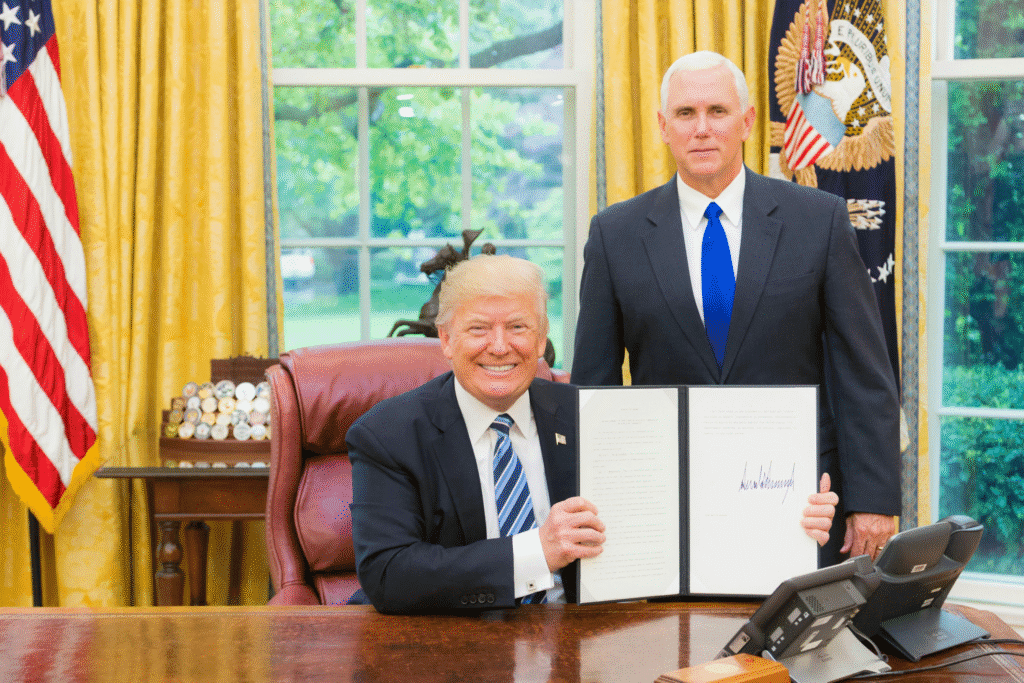A new report has found that if former President Donald Trump’s plan to impose heavy tariffs on imported medicines goes through, Americans could end up paying an extra $51 billion every year for their medications. The report warns that drug prices might shoot up by as much as 12.9 percent if these tariffs are put in place.
The idea behind the tariffs is to encourage more drug manufacturing within the US, but experts say this move could backfire by making medicines much more expensive for everyday people. The report was originally prepared for the US pharmaceutical industry’s main trade group and was reviewed by independent experts. It highlights just how much Americans rely on medicines made in other countries—especially in Europe.
If Trump’s proposed 25 percent tariff on foreign medicines becomes reality, drug companies will likely pass those extra costs onto consumers. This means higher prices for everything from common prescriptions to life-saving treatments. Many families already struggle with medical bills, and this could make things even harder for them.
Some politicians, like Senator JD Vance, have admitted that these tariffs would bring “profound changes” to the economy. While Trump supporters argue that tariffs could help bring drug manufacturing back to the US, critics say the immediate effect would be painful for millions of Americans who depend on affordable medicines.

The report also points out that the US doesn’t make enough of its own medicines to suddenly stop relying on imports. Building new factories and shifting production would take years, meaning prices could stay high for a long time. In the meantime, patients might have to choose between paying more for their prescriptions or skipping doses—a dangerous situation for those with serious health conditions.
Doctors and patient advocacy groups have expressed concern over the plan. They worry that higher drug prices could lead to more people rationing their medications or going without treatment altogether. For people with chronic illnesses like diabetes or heart disease, missing doses can have serious consequences.
The pharmaceutical industry has also pushed back against the idea, saying that tariffs could disrupt supply chains and make it harder for patients to get the medicines they need. Some companies might even cut back on research and development if their profits take a hit, slowing down the creation of new treatments.
While Trump and his supporters believe that tariffs will force other countries to play fair and bring jobs back to America, economists warn that trade wars often hurt consumers more than they help. Past tariffs on goods like steel and aluminum led to higher prices for cars, appliances, and other everyday items, and this could be a repeat of that situation—but with medicines, where the stakes are even higher.
The debate over drug tariffs is part of a bigger discussion about how to lower healthcare costs in the US. Many Americans already pay much more for medicines than people in other countries, and adding tariffs could make that gap even wider. Some lawmakers are calling for different solutions, like allowing Medicare to negotiate drug prices or capping how much pharmaceutical companies can charge.
For now, the tariffs are just a proposal, and nothing has been finalized. But if they do go into effect, the impact could be felt almost immediately. Pharmacies, hospitals, and patients would all see their costs go up, and there’s no guarantee that the long-term benefits—like more US manufacturing—would ever materialize.
As the 2024 election approaches, healthcare costs are sure to be a major topic. Voters will have to decide whether they believe tariffs are the right way to fix the system or if they’ll only make things worse. For now, one thing is clear: if these tariffs happen, American families will likely be the ones paying the price—literally.
The report serves as a warning that while the idea of bringing drug manufacturing back to the US sounds good, the reality could be much more complicated. Higher prices, supply shortages, and delayed medical research are all possible outcomes if the tariffs take effect. For millions of Americans who rely on affordable medicines, this could be a very costly experiment.
In the end, the decision will come down to whether lawmakers believe the potential benefits outweigh the immediate harm. But with $51 billion on the line—and the health of millions at stake—it’s a debate that could shape the future of American healthcare for years to come.


